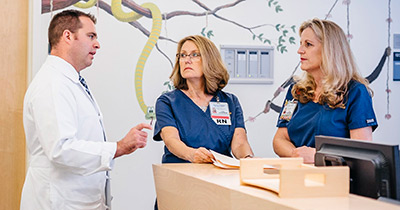Sarcoma
 Adult soft tissue sarcoma is a disease in which malignant (cancer) cells form in the soft tissues of the body.
Adult soft tissue sarcoma is a disease in which malignant (cancer) cells form in the soft tissues of the body.
Soft tissue sarcomas can start in muscles, tendons, blood vessels, fat, nerves, and deep skin tissues. There are more than 50 different types of soft tissue sarcomas. Most start in the arms and legs. But these cancers can start in almost any part of the body.
Some types of Sarcoma
- Angiosarcoma
- Chondrosarcoma
- Dermatofibrosarcoma protuberans
- Desmoplastic small round cell tumors
- Epithelioid sarcoma
- Ewing sarcoma
- Gastrointestinal stromal tumor (GIST)
- Kaposi's sarcoma
- Leiomyosarcoma
- Liposarcoma
- Malignant peripheral nerve sheath tumors
- Osteosarcoma
UC Davis Comprehensive Cancer Center is a regional referral center for the treatment of bone and soft-tissue sarcomas — cancers that affect bone, muscle, cartilage, blood vessels and other connective tissues in the body. Our physicians have extensive expertise in the treatment of these uncommon cancers in children and adults alike, and routinely handle the most difficult cases from throughout inland Northern California, Western Nevada and Southern Oregon.

